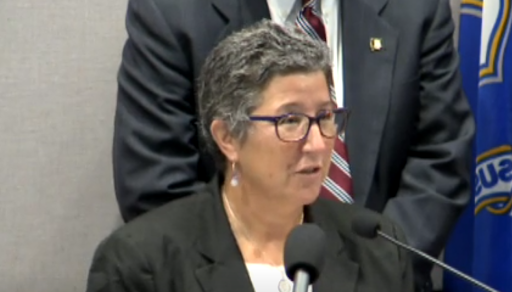Processing Your Payment
Please do not leave this page until complete. This can take a few moments.
- News
-
Editions
View Digital Editions
Biweekly Issues
- May 13, 2024
- April 29, 2024
- April 15, 2024
- April 1, 2024
- March 18, 2024
- March 4, 2024
- February 19, 2024
- February 5, 2024
- January 22, 2024
- + More
Special Editions
- Lists
- Viewpoints
- HBJ Events
- Business Calendar
- Custom Content
Health costs targeted by new benchmark effort by state
 Photo | CT-N
OHS Executive Director Victoria Veltri speaks during an Oct. 2019 press conference about healthcare costs.
Photo | CT-N
OHS Executive Director Victoria Veltri speaks during an Oct. 2019 press conference about healthcare costs.
Setting a target for cost increases in health care will help the state curb surging bills for residents and businesses, top health officials said at an event Wednesday.
The Office of Health Strategy convened a forum on healthcare affordability to highlight the need to quantify and take “corrective action” on rising costs in the state.
“High healthcare costs are not an abstract concept,” said Michael Bailit, a healthcare consultant hired to study Connecticut’s data on health claims.
Among Bailit’s findings:
Connecticut is consistently in the top 5 nationally for its rate of healthcare cost increases
Since 2000, Connecticut worker contributions to employer-sponsored insurance premiums have risen 2.5 times faster than personal income
From 2015 to 2018, employees’ out-of-pocket costs for health care increased 26%, while wages rose less than 2%
Out-of-pocket costs for workers increased in part because employers changed plans to shift costs to enrollees. But more workers are also opting for high-deductible plans in search of lower premiums, Bailit said.
The driver of higher costs in general are higher drug prices, hospitalization costs and chronic illnesses, Bailit found.
Setting a benchmark to control increases in costs can help the state control these costs, OHS chief Vicki Veltri said. Earlier this month Veltri announced that the state will get help from the Milbank Memorial Fund and Bailit Health to study affordability and implement a benchmark.
“More analysis and transparency can answer key questions,” said Rachel Block of Milbank.
“It is at its heart about better information.”
The new efforts on affordability come as opposition mounts to reform proposals coming from the governor’s office and Comptroller Kevin Lembo, who has crafted a public option proposal to address insurance costs.
The Democrats’ plans “will both make healthcare more expensive for middle-class families and will hurt good-paying Connecticut jobs at a time when our state and our residents are already struggling,” said a statement issued this week by state Senate Republican Leader Kevin Kelly (R-Stratford) and Sen. Tony Hwang (R-Fairfield), ranking senator on the insurance and real estate committee.
The Republicans have crafted their own plan that they claim both cuts drug prices and reduces insurance premiums by up to 30%. The plan, Senate Bill 1006, awaits action by the Insurance Committee ahead of a Thursday deadline for the bill to move forward or expire.

2022 Giving Guide
This special edition informs and connects businesses with nonprofit organizations that are aligned with what they care about. Each nonprofit profile provides a crisp snapshot of the organization’s mission, goals, area of service, giving and volunteer opportunities and board leadership.
Learn more
Subscribe
Hartford Business Journal provides the top coverage of news, trends, data, politics and personalities of the area’s business community. Get the news and information you need from the award-winning writers at HBJ. Don’t miss out - subscribe today.
Subscribe
2024 Book of Lists
Delivering Vital Marketplace Content and Context to Senior Decision Makers Throughout Greater Hartford and the State ... All Year Long!
Read Here-
2022 Giving Guide
This special edition informs and connects businesses with nonprofit organizations that are aligned with what they care about. Each nonprofit profile provides a crisp snapshot of the organization’s mission, goals, area of service, giving and volunteer opportunities and board leadership.
-
Subscribe
Hartford Business Journal provides the top coverage of news, trends, data, politics and personalities of the area’s business community. Get the news and information you need from the award-winning writers at HBJ. Don’t miss out - subscribe today.
-
2024 Book of Lists
Delivering Vital Marketplace Content and Context to Senior Decision Makers Throughout Greater Hartford and the State ... All Year Long!
ABOUT
ADVERTISE
NEW ENGLAND BUSINESS MEDIA SITES
No articles left
Get access now
In order to use this feature, we need some information from you. You can also login or register for a free account.
By clicking submit you are agreeing to our cookie usage and Privacy Policy
Already have an account? Login
Already have an account? Login
Want to create an account? Register
Get access now
In order to use this feature, we need some information from you. You can also login or register for a free account.
By clicking submit you are agreeing to our cookie usage and Privacy Policy
Already have an account? Login
Already have an account? Login
Want to create an account? Register





0 Comments